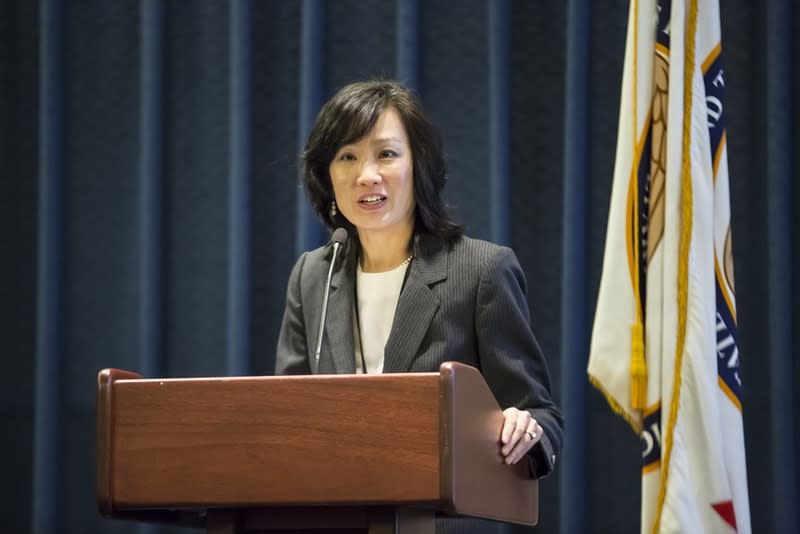Consumer Electronics Industry to Government: Do Something About Patent Trolls

Michelle Lee of the U.S. Patent and Trademark Office. (Photo: U.S. Department of Commerce)
The tech industry still hates patent trolls, but it’s starting to have good things to say about the government agency that issues the patents those trolls later wield in what amounts to a legalized extortion racket.
That was the somewhat surprising conclusion of a panel discussion at CES Friday morning that featured some of the leading critics of the current patent system — and was introduced by Michelle Lee, director of the U.S. Patent and Trademark Office.
A PTO director had apparently never before spoken at CES, so Lee’s presence alone represented a change. So did the substance of her remarks: We need to restore a sense of balance to patents, she said, and while the PTO has moved to issue more precise, clearer patents and then provide faster resolution when they’re challenged afterwards, Congress must help.
“When our Founding Fathers provided for intellectual property protection in the Constitution itself, they foresaw the need for balance,” Lee said. “It’s that balance that we’re working with Congress and stakeholders to achieve in patent litigation reform.”
The panelists who followed her — Rep. Darrell Issa (R-Calif.), Ditto.com CEO Kate Doerksen, NewEgg chief legal officer Lee Cheng, tech entrepreneur Bryan Menell, and Qualcomm counsel Laurie Self — only had nice things to say about Lee.
Trolling is (too) easy
They were nowhere as complimentary about the vague, broad patents handed out under her predecessors and their subsequent abuse by companies that buy them and then threaten other firms and even other firms’ customers with lawsuits, accusing them of infringing those patents.
The math favors a patent-trolling strategy. “The cost of assertion is almost nothing,” Cheng said, while challenging a patent at the PTO can add up to hundreds of thousands of dollars and a full-fledged legal defense can run $2 to $3 million.
“Right now it makes more sense to settle to save somebody’s job,” said Doerksen.
A bizarrely large share of these lawsuits — 44 percent in 2015, according to a report by the patent-services firm Unified Patents — land in a single court, the U.S. District Court for the Eastern District of Texas. There, they’re heard by one judge, Rodney Gilstrap, who has a history of sympathy towards patent litigants. Cheng’s overall assessment: ”It’s a joke.”
A bill that would curb the worst patent-trolling abuses, the Innovation Act, remains stalled in Congress, and the panel revealed some reasons for that holdup.
One is anxiety among companies heavily invested in the current system, such as Qualcomm.
“We’re talking about an incredibly complex and valuable ecosystem,” Self said. “You have to be very careful.”
Issa — a longtime supporter of patent reform who earlier founded an electronics firm and himself holds 37 patents — sounded fed up with Qualcomm’s hemming and hawing, leading to the unlikely sight of a Republican not only teeing off on a big American company but one that employs many of his constituents.
“We have to get to yes in Congress not based on making Qualcomm 100 percent happy,” Issa grumbled.
He added that universities that license patents to “non-practicing entities” — aka trolls — and then collect a share of the proceedings from infringement lawsuits represent another source of opposition to the Innovation Act.
Incremental improvements
In a chat afterwards with Yahoo Tech, the USPTO’s Lee said the agency is doing everything it can within current laws to make it easier to resolve patent disputes.
“Most patent claims are not litigated,” she said. “For those that are, we want to make sure we’re providing a high-quality, speedy process.”
For instance, the new appeals board mandated by an earlier patent-reform law, the America Invents Act, has not only seen widespread use to challenge existing patents in less time and at half the cost of going to court, its rulings are standing up.
“Almost all of our cases that have gone up on appeal have been affirmed,” Lee said.
She also said the patent office has also chipped away at a huge backlog of patent applications that had peaked in 2009 and was on its way to resolving that by 2019.
But broader fixes need Congress to get to work: “Certain changes are clearly going to require legislative changes.”
I asked Lee, a computer scientist and lawyer who previously worked for Google (but holds no patents herself), if it bothered her to see the PTO’s output exploited to shake down businesses like those we’d heard at the panel. “Any sort of patent litigation abuse should, I think, offend all of us,“ she responded.
It ought to, because it’s customers like you and me who ultimately eat the costs of bogus patent-infringement lawsuits. Or as Cheng said during the panel: “Everybody pays the toll of the troll.”
Email Rob at rob@robpegoraro.com; follow him on Twitter at @robpegoraro.


